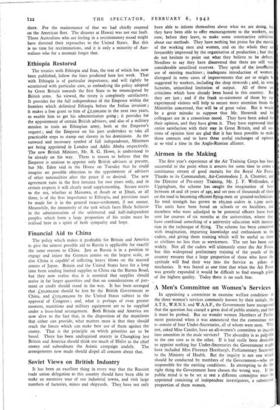Ethiopia Restored
The treaties with Ethiopia and Iran, the text of which has now been published, follow the lines predicted here last week. That with Ethiopia is of particular importance, and will rightly be scrutinised with particular care, as embodying the policy adopted by Great Britain towards the first State to be emancipated by British arms. So viewed, the treaty is completely satisfactory. It provides for the full independence of the Emperor within the frontiers which delimited Ethiopia before the Italian invasion ; it makes a free grant to him of L2,500,000 in the next two years, to enable him to get his administration going ; it provides for the appointment of certain British advisers, and also of a military mission to train an Ethiopian army, both at the Emperor's request ; and the Emperor on his part undertakes to take all practicable steps to stamp out slavery in his dominions. As the outward and necessary symbol of full independence, Ministers are being appointed in London and Addis Ababa respectively. The new British Minister, Mr. R. G. Howe, is understood to be already on his way. There is reason to believe that the Emperor is anxious to appoint only British advisers at present, but Mr. Eden said in the House on Tuesday that he could imagine no possible objection to the appointment of advisers of other nationalities after the peace if so desired. The new agreement runs in the first instance for two years only, and in certain respects it will dearly need supplementing. Secure access to the sea, whether at Massawa, at Assab or at Jibuti, or all three, is of the first importance to Ethiopia, and provision must be made for it in the general peace-settlement, if not sooner. Meanwhile, the immensity of the task which faces Haile Seilassie in the administration of the unlettered and half-independent peoples which form a large proportion of his realm must be realised here in a spirit of both sympathy and hope.


























 Previous page
Previous page